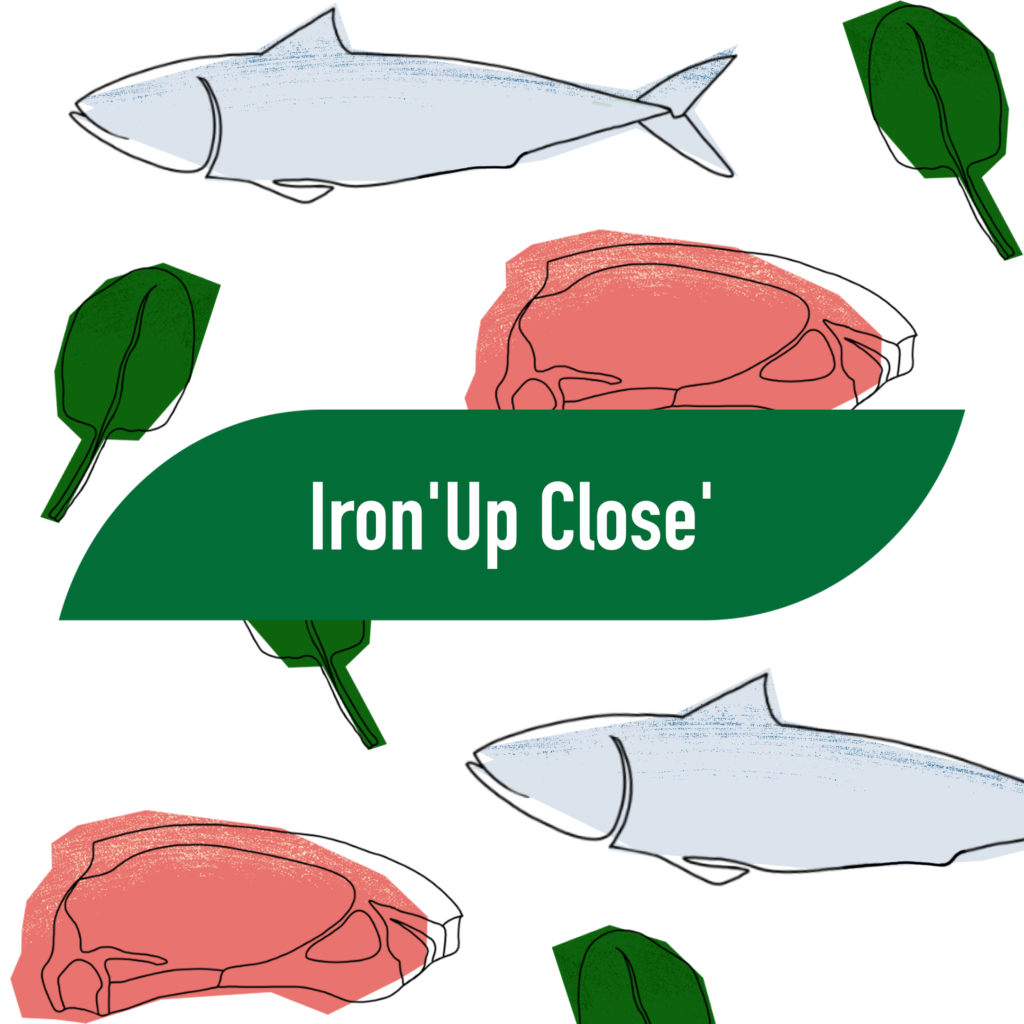Iron ‘Up Close’

What is iron and why do we need it?
Feeling lethargic and exhausted? Iron deficiency anaemia is the most common type of anaemia. Anaemia is a common medical condition in which you lack red blood cells to carry around oxygen in your body.
Iron is a mineral, which plays a special role in human health and disease. We need iron for the formation of haemoglobin and myoglobin. Haemoglobin is a protein that carries oxygen around the body from our lungs, to our organs and tissues. Myoglobin is a protein that can be found in the muscle cells and it stores and releases oxygen. We call upon the oxygen stored in myoglobin when we use our muscles to walk, run, climb or move in any way.
What is the recommended daily intake of iron?
The recommended intake of iron is:
- For men (over 18 years): 8.7 mg/day
- For women (aged 18 to 50): 14.8 mg/day
- For women (over 50 years): 8.7 mg/day
Women require more iron than men to make up for the amount of iron they lose during menstruation. Around 1 mg of iron is lost for every day of bleeding.
“Dietary iron is found in two basic forms, heme and non-heme. Heme iron is the most bioavailable form of iron.”
Most people are able to obtain all the iron they need a healthy, varied diet. The body has certain ‘iron balancing’ systems in place to make sure we just get enough, and not too much. When we have an intake of iron that’s too high, we can feel sick, constipated, nauseous and experience stomach pains. Very high doses of iron can even be fatal, so never exceed the recommended usage when you take a supplement.
A person who is iron deficient may be anaemic and as a result, may have one or more symptoms of anaemia (lack of red blood cells). These can range from mild to more severe and include but are not limited to chronic fatigue, weakness, dizziness, headaches and depression.
Which foods contain iron?
Dietary iron is found in two basic forms, heme and non-heme. Heme iron can be found in animal-based food sources, non-heme iron can be found in plant-based foods. Heme iron is the most bioavailable form of iron, meaning it is more easily absorbed by our body for use.
Vitamin C and/or heme iron consumed at the same time or within the same meal can improve the absorption of non-heme iron. Polyphenols on the other hand, found in tea, coffee and wine, have been demonstrated to inhibit non-heme iron absorption. Calcium has also been found to inhibit both the uptake of heme and non-heme iron. These factors bind to iron in the intestine and prevent the iron from being completely absorbed.
Sources of heme iron:
- Meat and poultry
- Fish
- Clams, oysters and mussels
- Eggs
Sources of non-heme iron:
- Beans
- Pulses
- Nuts
- Seeds
- Green leafy vegetables (Spinach, Kale, Broccoli, Cabbage)
- Soy products (Tofu, Tempeh)
- Fortified cereals
How can I increase iron levels in my diet?
“Always ask for advice from your GP before iron supplementation, as excessive intake of iron can be harmful”
For most of us, a healthy diet with plenty of variety will supply us with sufficient iron intake, but in case you need some extra tips on iron-rich meals, we’ve got just that!
- Alternate between iron-rich animal-based protein sources such as red meat, poultry and fish
- Add pulses and legumes such as beans and lentils to bulk out plant-based stews or curries
- Sprinkle salads (or any meals) with nuts and seeds, or dried fruits such as apricots and raisins
- Dress leafy green full salads with a source of vitamin C such as a squeeze of lemon, to promote better absorption of non-heme iron
- Try to avoid consuming foods which may inhibit iron absorption at the same time, such as dairy products or tea, coffee and wine
For some people, a supplement can be recommended (women who experience heavy bleeding during menstruation, endurance athletes, or those who have suffered blood loss due to surgery or an accident for example). However, always ask for advice from your GP before iron supplementation, as excessive intake of iron can be harmful.
Fresh Fitness Food provides personalised meals plans delivered straight to your door, ensuring not only that you have the nutrients you need to manage your stress levels, but also that you have the time usually spent shopping, cooking and washing up, to engage in your favourite stress reducing activity. To discuss which nutrition plan is right for you, book a call with our in-house nutrition team here.
Order today and start smashing your goals with personalised nutrition!
Get £50 off a 5-day trial with code: BLOG50
- The Comfort of Tradition: Why We Crave Holiday Foods - December 23, 2024
- Is There a Place for Ultra-Processed Foods in Your Diet? - November 29, 2024
- Tempeh and Quinoa Power Bowl Recipe - November 7, 2024